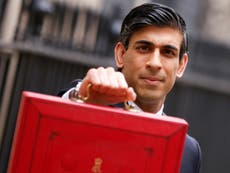Discourtesy achieves nothing – we have to get along with the EU
The task is to feel the way towards that new relationship, so that both sides gradually become more comfortable with each other than they are right now, writes Hamish McRae


Lord Frost is right. The UK and Europe need to “reset” their relationship. Whether our robust former Brexit negotiator is the right person to engineer that reset is another matter.
There are several instances where the relationship has got off to a bad start. There has been the rumbling row over vaccines, most recently with the new prime minister of Italy, Mario Draghi, banning the exports of AstraZeneca’s vaccines to Australia and calling for the EU to “suffocate” pharmaceutical companies that were unable to meet supply schedules.
There are rows about exports of shellfish to Europe; about the flow of goods between Northern Ireland and the rest of the UK; about customs hold-ups on UK exports to Europe; and many more. Boris Johnson has argued that these are “teething problems”, but there are fears that, at least as far as Northern Ireland is concerned, such problems will be very hard to resolve.
We have to get along, though. It is powerfully in the self-interest of both sides that there should be a reasonable working relationship between the UK and the EU, just as there is a reasonable working relationship between the UK and the US. So how do we get there? Here are five ideas.
First, we have to recognise that this will take time. A lot of the problems are about detail. An instant bureaucracy has been erected between the UK and Europe, and it will take a while to figure out which bits of those bureaucratic barriers are reasonable and justified, and which are unnecessary and damaging to both sides. There will be continuing disputes over trade movements, but trade is not a zero-sum game. Trade happens because both sides want to exchange goods and services with each other. Why should they not do so?
Next, both the UK and the EU will have to accept that the two sides will diverge. This is not simply a matter of regulation. It is a matter of global economics. UK exports to the EU have been falling for more than a decade, as other markets have grown faster. That is a function of the shift of economic weight away from the old developed world and towards the emerging world. It is not just the UK that is affected by the likelihood that China will become the world’s largest economy within a decade. Last summer, China became Germany’s biggest export market.
The challenge to both the EU and UK is not to let this gradual rebalancing to happen unnecessarily quickly. There was a 30 per cent fall in German exports to the UK in January. UK exports to Germany also fell, though by a smaller proportion. This is not good for either side.
Third, businesses on both sides of the Channel need to make their voices heard in their national governments. Lobbying Brussels doesn’t work, for the commission is a regulatory body, not a trade promotion one. The business communities have political leverage, but only at local and national levels. If governments find their companies are suffering, they will start to find ways of easing unnecessary barriers. This is about mutual self-interest, not grand principles.
Fourth, there probably needs to be some kind of joint task force specifically to clear unnecessary trade barriers. This should be a low-key affair, avoiding headlines, and quietly pecking away at difficulties that had not been foreseen in that helter-skelter rush before Christmas to get a trade deal signed. Yes, there are of course continuing discussions, but I am not sure the tone has, thus far, been helpful. Indeed I think that is why Lord Frost uses the word “reset”.
That leads to the final point. For the reset to work, there has to be courtesy. Whatever view people take of the outcome of the negotiations over the past five years, or indeed of the whole Brexit issue, the past is the past. Discourtesy achieves nothing.
How the UK and Europe deal with each other is now a practical issue. It will be a transactional relationship, sometimes cooperating, sometimes competing. It will evolve over time as the fissure recedes. The task is to feel the way towards that new relationship, so that both sides gradually become more comfortable with each other in 10 years’ time than they are right now.
Too much to ask? Surely not.



Join our commenting forum
Join thought-provoking conversations, follow other Independent readers and see their replies
Comments